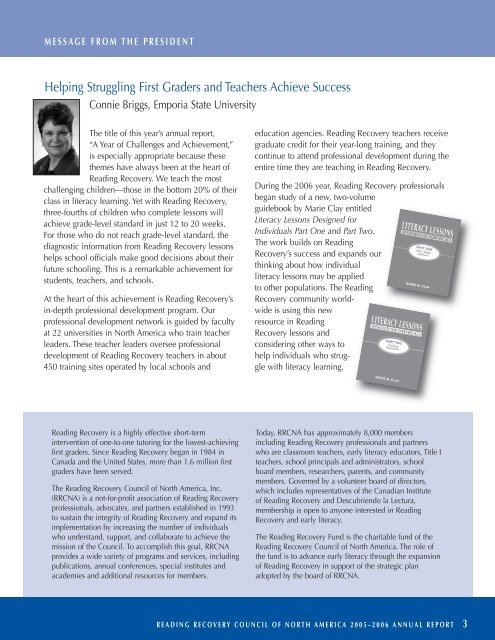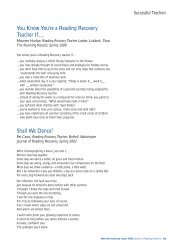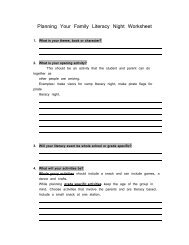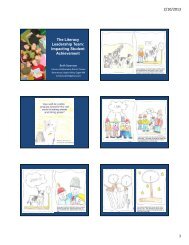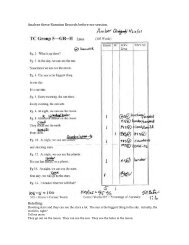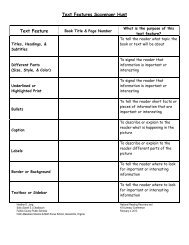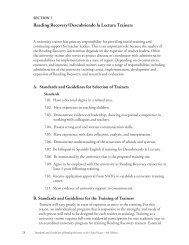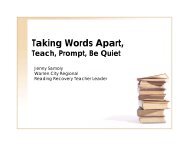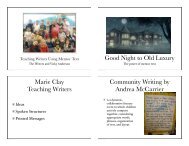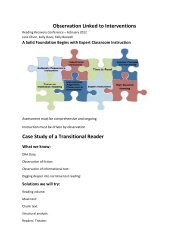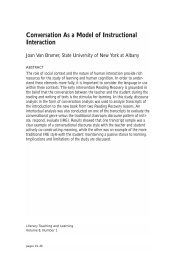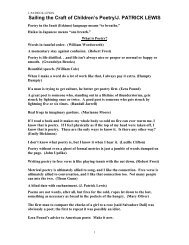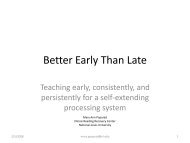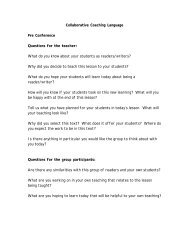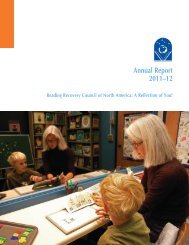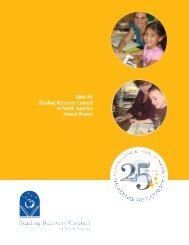2005-06 - Reading Recovery Council of North America
2005-06 - Reading Recovery Council of North America
2005-06 - Reading Recovery Council of North America
Create successful ePaper yourself
Turn your PDF publications into a flip-book with our unique Google optimized e-Paper software.
MESSAGE FROM THE PRESIDENT<br />
Helping Struggling First Graders and Teachers Achieve Success<br />
Connie Briggs, Emporia State University<br />
The title <strong>of</strong> this year’s annual report,<br />
“A Year <strong>of</strong> Challenges and Achievement,”<br />
is especially appropriate because these<br />
themes have always been at the heart <strong>of</strong><br />
<strong>Reading</strong> <strong>Recovery</strong>. We teach the most<br />
challenging children—those in the bottom 20% <strong>of</strong> their<br />
class in literacy learning. Yet with <strong>Reading</strong> <strong>Recovery</strong>,<br />
three-fourths <strong>of</strong> children who complete lessons will<br />
achieve grade-level standard in just 12 to 20 weeks.<br />
For those who do not reach grade-level standard, the<br />
diagnostic information from <strong>Reading</strong> <strong>Recovery</strong> lessons<br />
helps school <strong>of</strong>ficials make good decisions about their<br />
future schooling. This is a remarkable achievement for<br />
students, teachers, and schools.<br />
At the heart <strong>of</strong> this achievement is <strong>Reading</strong> <strong>Recovery</strong>’s<br />
in-depth pr<strong>of</strong>essional development program. Our<br />
pr<strong>of</strong>essional development network is guided by faculty<br />
at 22 universities in <strong>North</strong> <strong>America</strong> who train teacher<br />
leaders. These teacher leaders oversee pr<strong>of</strong>essional<br />
development <strong>of</strong> <strong>Reading</strong> <strong>Recovery</strong> teachers in about<br />
450 training sites operated by local schools and<br />
education agencies. <strong>Reading</strong> <strong>Recovery</strong> teachers receive<br />
graduate credit for their year-long training, and they<br />
continue to attend pr<strong>of</strong>essional development during the<br />
entire time they are teaching in <strong>Reading</strong> <strong>Recovery</strong>.<br />
During the 20<strong>06</strong> year, <strong>Reading</strong> <strong>Recovery</strong> pr<strong>of</strong>essionals<br />
began study <strong>of</strong> a new, two-volume<br />
guidebook by Marie Clay entitled<br />
Literacy Lessons Designed for<br />
Individuals Part One and Part Two.<br />
The work builds on <strong>Reading</strong><br />
<strong>Recovery</strong>’s success and expands our<br />
thinking about how individual<br />
literacy lessons may be applied<br />
to other populations. The <strong>Reading</strong><br />
<strong>Recovery</strong> community worldwide<br />
is using this new<br />
resource in <strong>Reading</strong><br />
<strong>Recovery</strong> lessons and<br />
considering other ways to<br />
help individuals who struggle<br />
with literacy learning.<br />
<strong>Reading</strong> <strong>Recovery</strong> is a highly effective short-term<br />
intervention <strong>of</strong> one-to-one tutoring for the lowest-achieving<br />
first graders. Since <strong>Reading</strong> <strong>Recovery</strong> began in 1984 in<br />
Canada and the United States, more than 1.6 million first<br />
graders have been served.<br />
The <strong>Reading</strong> <strong>Recovery</strong> <strong>Council</strong> <strong>of</strong> <strong>North</strong> <strong>America</strong>, Inc.<br />
(RRCNA) is a not-for-pr<strong>of</strong>it association <strong>of</strong> <strong>Reading</strong> <strong>Recovery</strong><br />
pr<strong>of</strong>essionals, advocates, and partners established in 1993<br />
to sustain the integrity <strong>of</strong> <strong>Reading</strong> <strong>Recovery</strong> and expand its<br />
implementation by increasing the number <strong>of</strong> individuals<br />
who understand, support, and collaborate to achieve the<br />
mission <strong>of</strong> the <strong>Council</strong>. To accomplish this goal, RRCNA<br />
provides a wide variety <strong>of</strong> programs and services, including<br />
publications, annual conferences, special institutes and<br />
academies and additional resources for members.<br />
Today, RRCNA has approximately 8,000 members<br />
including <strong>Reading</strong> <strong>Recovery</strong> pr<strong>of</strong>essionals and partners<br />
who are classroom teachers, early literacy educators, Title I<br />
teachers, school principals and administrators, school<br />
board members, researchers, parents, and community<br />
members. Governed by a volunteer board <strong>of</strong> directors,<br />
which includes representatives <strong>of</strong> the Canadian Institute<br />
<strong>of</strong> <strong>Reading</strong> <strong>Recovery</strong> and Descubriendo la Lectura,<br />
membership is open to anyone interested in <strong>Reading</strong><br />
<strong>Recovery</strong> and early literacy.<br />
The <strong>Reading</strong> <strong>Recovery</strong> Fund is the charitable fund <strong>of</strong> the<br />
<strong>Reading</strong> <strong>Recovery</strong> <strong>Council</strong> <strong>of</strong> <strong>North</strong> <strong>America</strong>. The role <strong>of</strong><br />
the fund is to advance early literacy through the expansion<br />
<strong>of</strong> <strong>Reading</strong> <strong>Recovery</strong> in support <strong>of</strong> the strategic plan<br />
adopted by the board <strong>of</strong> RRCNA.<br />
READING RECOVERY COUNCIL OF NORTH AMERICA <strong>2005</strong>–20<strong>06</strong> ANNUAL REPORT 3


